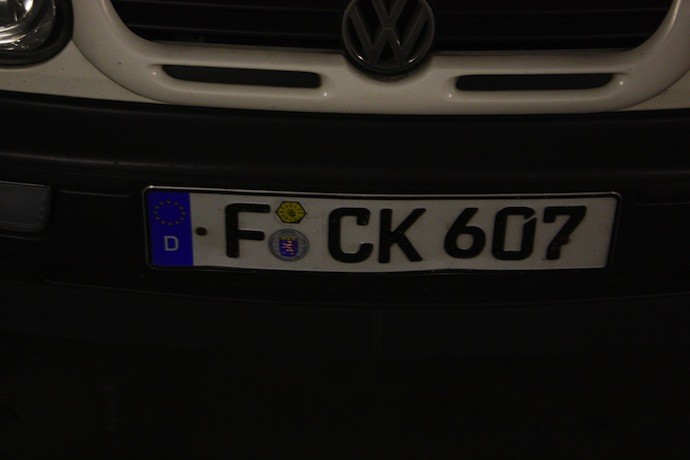
When traveling to other countries where they speak a language you don’t, fluency isn’t typically required to get around. Yet the first few lessons of a language course may turn out not to be as useful as you would have hoped either. A specific dialect is more relevant for your vacations: the language of tourist.
Travelers use language for very specialized functions where you can focus your educational efforts – with the right technology – to become functionally more fluent than learning language in linear fashion. You’ll not only be able to get around words, but streets better as a result.
 Don’t Start At Step #1
Don’t Start At Step #1
The advice to “pick up a language” when going on vacation is a bit misleading since you’re only ever learning parts of it at a time. You’re not going to “pick it up” like a box from the ground to the back of a truck – you’ve got to start thinking that there is no truck. The true masters of language acquisition – children – aren’t concerned about some hypothetical perfection of communication, they just want to get their ideas across. Once you accept that, you’re well on your way to learning tourist.
Focus On Greetings, Transportation, And The Five Three Double-Yous
Hello and goodbye are language essentials; though “what is your name” might not be the logical next step for a traveler. You’ll want to pin down directional words and those specifically referring to the most common methods of transportation you’ll be using. Car, bus, train can seems simple enough until you’re in the middle of Oman and nobody knows what you’re talking about.
- Of course, languages aren’t purely spoken and you can pick up a general idea of what gestures to expect the free site Travel Etiquette. Combine that with the nifty site Fasten Seat Belts to learn how to count to 10 with one hand in Chinese or figure out the Turkish mini-bus (dolmus) system.

Much like bulking up your muscles, work your brain cells in pairs. These are 4 word combinations to begin your tourist tongue eduction in because our minds work better with groups. Double words and double, well the “W” triplets of what, when, where. Who and why are optional if you really what to boil it down.
Where To Learn The Words That Are Coming Out Of Their Mouths
There are so many good, free online language resources it almost makes it difficult to find the right one for you. I’ve covered my favorite free online language courses in the past and later updated it to include these free language social networks. Practicing with a partner online can help reduce your anxiety about speaking that language before your next trip and also help you pick up 3 things that turn you from a stumbling tourist into a confused local.
 Learn To Curse, Pick Up Filler Words, And Talk With A Lisp If You Have To
Learn To Curse, Pick Up Filler Words, And Talk With A Lisp If You Have To
Let’s face it – the dirty curse words of any language are often the most memorable and fun to learn. Also, they tend to be coupled with body parts, family members, and animals which come in handy too. You Swear is an ad-heavy site that’s good for it’s digital worth in filthy language to balance out the nice greetings you’ve already picked up.
Filler words like “um” in English, “yaw” in Swedish, and “eh” in Italian are technically called disfluancies. Those words which seem useless to us adults actually help children learn their mother tongues. That’s because a disfluancy (aka. filler word) indicates the word to follow is one we are less familiar with. Research from the University of Rochester shows that children tend to take special notice of the words that come after fillers. The fillers highlight what’s unknown and worth learning – and since we’re thinking like children – can do the same for us.
 On the flip side, you can use this Wikipedia list of filler words in various languages to put natural stops when speaking in a foreign tongue. You’ll sound more fluent while searching for the next term you’re looking for. Also, while there’s no solid research on it yet – filler words may subconsciously highlight words you need to pay attention to and recall in the future.
On the flip side, you can use this Wikipedia list of filler words in various languages to put natural stops when speaking in a foreign tongue. You’ll sound more fluent while searching for the next term you’re looking for. Also, while there’s no solid research on it yet – filler words may subconsciously highlight words you need to pay attention to and recall in the future.
- Most Spaniards speak Spanish with a variation of a lisp (substituting a “th” sound for a “s”). In Bulgaria people nod backwards and in the United States south, people tend to use “ya’ll” for “you-all”. Paying a little extra notice to those local deviations and adding them to your own speech make you sound more natural – and may endear you even more to locals. People appreciate you how much effort you put into learning their language, when you take the time to also include their local version it goes that much further.
Use The Universal Translator In Your Pocket
While there are many smart phone translation apps, the future is a Star Trek Universal Translator – the first version of which is Vocre for the iPhone. It’s not perfect by any means – limited to to around 10 languages and requiring an Internet connection to work. (Plus it’s noticeable lack of an Android version.) Still, if the stars align for you, Vocre might be a good addition to your iPhone.Upcoming improvements and competitors mean we’re only seeing the beginning of dynamic translators to come.
- Aside from practicing your speaking skills with your online buddies (see above) you can check your pronunciation with Free Pronunciation Checker for Android or Forvo for iPhone.
Also, you can try switching you Facebook account over to the language you’ll be visiting for a few minutes each day. Learning words by associations (you might not have noticed it say “Home”, “Photos”, and “Friends” all up there but you’ll likely recognize them in another language without even thinking about it.
Don’t Be Afraid To Use What You Know
When using the language or tourist – or just when traveling in general – it’s understood that you’re foreign. Get over it – much like a little kid doesn’t care she’s not getting it quite right and just wants her damn cookie – your objective is to get to the train station or find out how much that camel ride costs. The first step of language is the most important for communication – if you don’t take it, you’re not traveling quite as far as you could be.
[top photo of men talking by: dobrych, F*CK license plate by batigolix, word decree shirt photo by RLHyde]












cool post – I like the no-nonsense approach to language learning and I can only agree: if you can shake the urge for perfection and correct grammar, you’ll have an easier time communicating (a.k.a finding the train station).
one thing: while it might be “endearing” to locals when you try to use the local slang, I would be careful with trying to do the accent – sometimes locals find it more irritating than charming.
In many cases with the accents subtlety is key and all within context of course 🙂
An interesting post with a different angle.
‘Thank you’ is the very first bit of local language that I always learn whenever I’m in a new country, as I think it’s the most important in terms of creating good feeling with locals, even if you don’t manage to pick up anything else.
I usually harangue the reception staff of whichever accommodation I stay at first for a few key words/phrases to get me started too.
It’s often the phrase we end up using first, even without realizing it. Certainly a good one to have in the language toolbox 🙂
You might like this, on the app front: http://getconverse.com/ 🙂
Awesome, thanks!
Anil, thanks for the great post! You’ve provided interesting tips about how to get a different grasp on a new language, and I learned a new word today “disfluency”.
In German, I’ve been using “na” or “oder” a lot to end sentences; e.g., Er ist noch da, oder? “He’s still there, right?). Whether that’s correct or even acceptable is anyone’s guess; at least my friends haven’t visibly cringed.
In Cantonese, I tend to use “啊” (“ah”) a lot, but I think many who speak this dialect also do the same.
It’s a fun word isn’t is? Sounds like a stomach virus 😛 I too notice how individuals tend to have favorite filler words – our little linguistic culture within a language 🙂
I think it’s not a hard task to learn a few basic expressions (like: “hello”, “good bye”, “thank you”, “how can I get to X point?” etc.) in the language of the country you plan to visit, nor do you necessarily need to download the ultimate high-tech guide in order to find your way through a city you’ve never visited before. You just have to WANT to learn the basics: once you do that, you’ll see that [at least most of the times] the locals will respect you for your effort and will gladly help you.
The motivation for want is the most difficult part. Making things easy and fun works for both kids and adults 😉
Great post. Although I do try to do exactly what you suggested here I also find I get a little ‘shy’ at times and don’t use the words I actually know. It is something I need to work on.
That’s probably the biggest hindrance for us adults and what gives children an advantage. They go on with their mistakes, which helps highlight where they need to focus improvements on (when they’re corrected).
Many of us have the problem where we fall back on only what we’re sure of – maybe a good trick is to practice with a child native speaker 🙂
Hi Anil, great post as usual, I agree with what Debbie said, that it’s easy to be a little shy. I think it’s important to speak firmly and not quietly. If we speak in a quiet, muffled, under confident way (as we all often do when learning and unsure) it results in puzzled faces and requests to say it again, further knocking confidence because we then think what we said was wrong! So head up, make good eye contact and speak firmly and confidently!
Thank you Connie 🙂 Great advice and absolutely true, it can be quite a discouraging cycle if we mumble our way through a few sentences…
I think you hit on the head when you said lose perfection and just get your idea across. Also loved that you added swear words and the local lisp or accent because these move you from tourist to that “Nationality” guy here.
People appreciate a commitment to the details and perfection, especially when it’s their language you apply those attributes to 😉